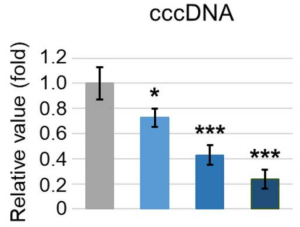A group from Department of Molecular Biochemistry and Clinical Investigation, Osaka University Graduate School of Medicine, Osaka, Japan, etc. has reported that core fucose-binding lectin Pholiota squarrosa lectin (PhoSL) inhibits HBV infection.
https://www.ncbi.nlm.nih.gov/pmc/articles/PMC10105536/
Current anti-HBV therapies include nucleoside and nucleotide analogs, which can competitively inhibit HBV replication2,3, and pegylated interferons, which can modulate the host immune response to HBV infection and induce the degradation of covalently closed circular DNA (cccDNA) in hepatocytes.
In this study, it was investigated the effects of PhoSL on HBV infection of the human cell line HepG2-hNTCP-C4, and also analyzed the molecular mechanisms underlying PhoSL-mediated inhibition of HBV infection. It was shown that the treatment with PhoSL dramatically decreased the levels of human HBV e antigen (HBeAg) , cccDNA (as shown belwo), HBV DNA, and HBV RNA), markers of HBV infection, in a dose-dependent manner without cytotoxicity.
There are two possibilities: (1) PhoSL affects the protein dynamics of the host cells, or (2) PhoSL binds to HBV.
As aresult, it was found that PhoSL inhibits EGFR activation by blocking the binding of EGF to EGFR, and also PhoSL binds to HBV particles directly. HBV particles bound by PhoSL are internalized into host cells, and PhoSL seems to inhibit HBV infection after internalization.
PhoSL treatment could contribute to the development of novel anti-HBV therapies.

